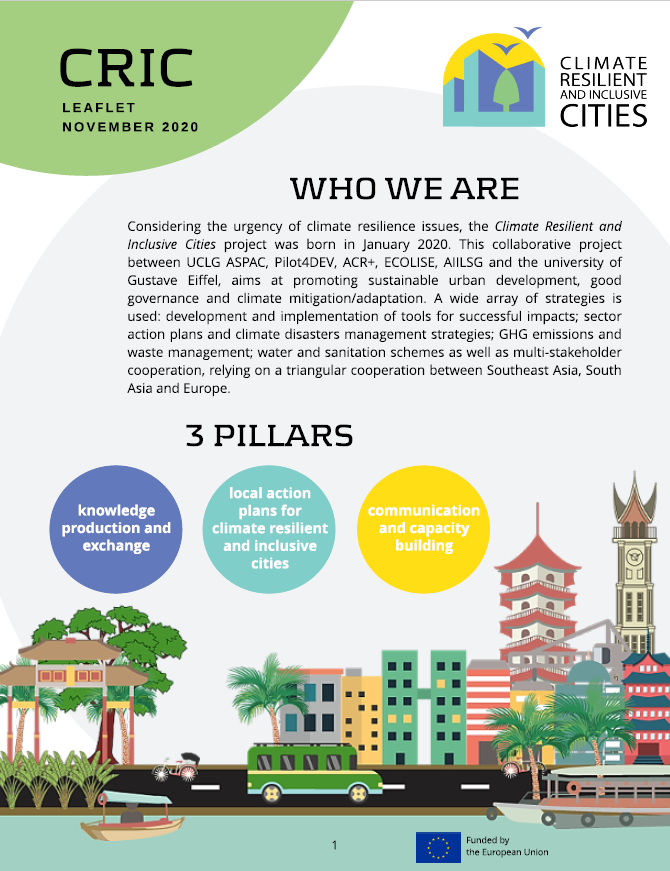European Union funded Project implemented by UCLG ASPAC, Pilot4DEV, ACR+, ECOLISE, AIILSG, and Gustave Eiffel University
CRIC Project Leaflet
With an urban growth averaging 4.4% annually, Indonesia experiences the highest rate of urbanisation in Asia (higher than in India and China). It is predicted that 68% of the population will live in cities in the next ten years. Urban population densities exceed 15,000 habitants/km² in cities like Jakarta and more than 30,000 habs/km² in some inner-city areas. Cities are hardly hit by climate change, although they could be seeds for solutions. Cities like Jakarta are sinking below sea level and could be expected to sink by 2050. Countries like Vietnam (36% of urban population) and the Philippines (45%) concentrate large urban areas, with fast growing centres. Urban areas host most of the vulnerable populations, as well as vital and social infrastructure, and local governments have increased pressure to develop services, infrastructure, employment (UN-Habitat).
The overall objectives of the project is to propose a long lasting and unique cooperation between cities and research centres in Europe, Indonesia and other countries from South East Asia, and to contribute substantially to sustainable integrated urban development, good governance, and climate adaptation/mitigation through long lasting partnerships, and tools such as sustainable local action plans, early warning tools and experts panels.
The specific objectives are:
-
To strengthen good governance: continued promotion of good governance, and the necessary policy and legal frameworks to implement urban policies.
-
The sustainable use of resources by cities: climate mitigation and adaptation can be achieved by a better understanding of local resources, and the empowerment of people.
-
Social cohesiveness and inclusive cities: the project will pay a special attention to the question of informal settlements, rural migrants and marginalisation.
-
Resilience and actions for the environment: the project will support the transition to more resource efficient systems of production and consumption. It will develop early warning systems for the selected cities, and an analysis of the main sources of pollution.
-
Prosperity and Innovation in cities, innovation, culture, design, and the identification of sustainable financing mechanisms.
-
The promotion of triangular cooperation: will be developed with knowledge exchange and joint trainings among countries from the South and Southeast Asia (Indonesia, Malaysia, Vietnam, Philippines, India, and Nepal).
Hundreds of millions of people in poorer urban areas are hit by pockets of deprivation, when not lack of basic infrastructure (such as water and sanitation). Problems will worsen when the most fragile territories could be affected by rising sea levels, flooding, landslides, toxic peaks of air pollution, typhoons alerts, storms, or periods of more extreme heats and droughts related to climate change. Cities and local governments are increasingly recognized as key actors in addressing climate challenges and SDGs. United Cities and Local Government Asia Pacific (UCLG ASPAC) as an association of the local governments is the key actor as knowledge management hub on LGs’ issues in the Asia Pacific region. UCLG ASPAC has strong sources of leadership that require enabling frameworks and a combination of measures to achieve the changes that are needed.
Considering the urgency of the climate resilience issues, UCLG ASPAC initiated the Climate Resilience Inclusive Cities (CRIC) Project. It is a five (5) years project with overall objectives to propose a long lasting and unique cooperation through a triangular cooperation between cities and research centres in Europe, South Asia (India, Nepal, Bangladesh), and Southeast Asia (Indonesia, Malaysia, Philippines, Thailand). The Project will also contribute to sustainable integrated urban development, good governance, and climate adaptation/mitigation through long lasting partnerships, and tools such as sustainable local action plans, early warning tools, air quality and waste management in consultation with experts’ panels.
The target groups of the Project will be local governments, cities, urban stakeholders working on climate resilience, climate mitigation and adaptation, and good governance of inclusive cities. With final beneficiaries including but not limited to local community of the cities/provinces, including women, marginalised sector, civil society and private sectors.
The Project has the following 3 Pillars as the targeted outcomes of the activities:
Pillar 1: Knowledge production and exchange
- Production of knowledge and urban analysis
- Urban reports
- Strengthened tools and exchange between European, Indonesian and other Asian cities
Pillar 2: Local action plans for climate resilient and inclusive cities
- Strengthened cities and LA’s capacities in the design and implementation of inclusive public policies;
- Improvement of the quality, delivery and equitable access to basic services and infrastructure;
- Enhanced capacities of cities and LAs in managing urban waste and air pollution, Promoted green low carbon and climate resilient urban development and urban circular economy;
- Enhanced capacities of cities, villages and LAs in managing (multi-hazard) disaster risks, and promoting shock responsive and resilience infrastructure and services.
Pillar 3: Communication and Capacity Building
- Improved institutional, financial and administrative capacities of cities and LAs;
- Strengthened mechanisms for consultation, coordination and cooperation among public, private, civil society sectors and other relevant stakeholders in the decision making and production of urban development policies;
- Strengthened capacities of cities and LAs in using smart technologies,
- Improved public-private partnerships and schemes for local economy.


